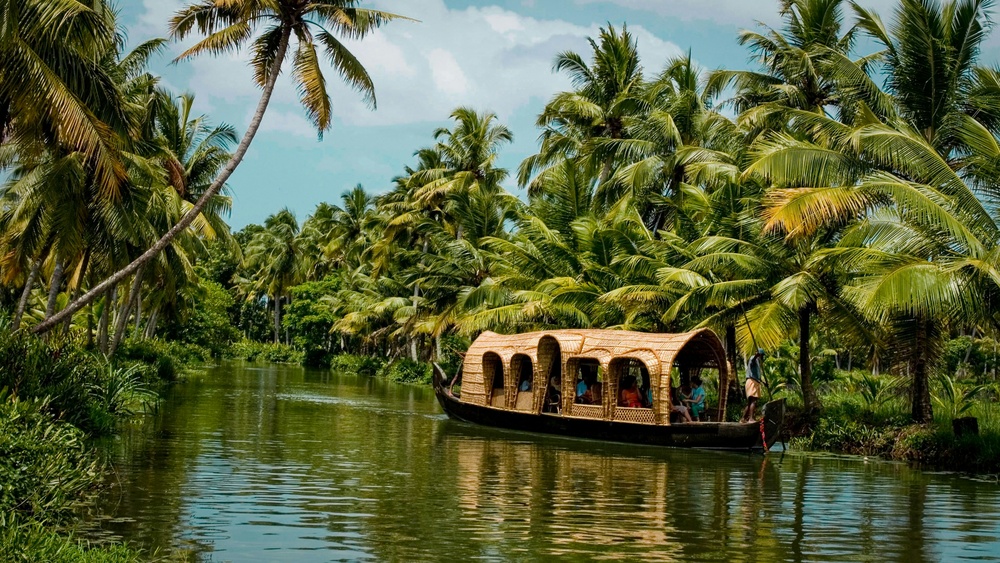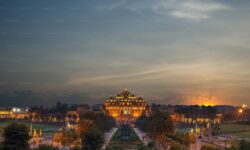Nestled between the Arabian Sea and the Western Ghats, Kerala is a breathtaking destination that earns its moniker “God’s Own Country” with grace and grandeur. From tranquil backwaters and lush hill stations to golden beaches and vibrant cultural festivals, Kerala tourism offers an enriching travel experience like no other. Whether you seek relaxation, adventure, culture, or cuisine, Kerala has something to delight every traveler.
A Backwater Paradise
One of the most iconic aspects of Kerala tourism is its mesmerizing backwaters—an intricate network of rivers, lakes, and canals that wind through palm-fringed villages and paddy fields. A houseboat cruise in places like Alleppey or Kumarakom is a quintessential Kerala experience. These houseboats, locally known as kettuvallams, are equipped with modern amenities and offer a peaceful escape into nature, where you can witness life on the water and enjoy authentic Kerala cuisine on board.
Hill Stations and Tea Gardens
Kerala’s hill stations offer a refreshing contrast to its lowland backwaters. Munnar, located at 1,600 meters above sea level, is renowned for its rolling hills covered in tea plantations. The cool climate, mist-covered valleys, and fragrant spice gardens make it a favorite among honeymooners and nature lovers. Other notable hill stations include Wayanad, Thekkady, and Vagamon, each offering serene landscapes, trekking trails, and wildlife experiences.
Beaches and Coastal Charm
Kerala’s long coastline is dotted with serene beaches that are less commercialized and more relaxed compared to other coastal destinations in India. Kovalam and Varkala are popular for their crescent-shaped beaches, lighthouses, and beachfront resorts. Cherai Beach near Kochi offers a blend of sea and backwater experiences, while Marari Beach is perfect for those looking for peace and solitude.
Rich Cultural Heritage
Kerala tourism is deeply intertwined with its rich cultural traditions. The state is famous for its classical dance forms like Kathakali and Mohiniyattam, which are often performed in local theaters and festivals. The art of Kathakali, with its elaborate costumes and expressive storytelling, is a must-see for any visitor.
Kerala also celebrates a multitude of festivals that highlight its diverse heritage. Onam, the state’s most important festival, features floral designs (pookalam), boat races, traditional feasts (sadya), and cultural performances. The Thrissur Pooram is another grand celebration with vibrant processions and fireworks.
Wildlife and Eco-Tourism
Kerala is a haven for wildlife enthusiasts and eco-tourists. The Periyar Wildlife Sanctuary in Thekkady is home to elephants, tigers, and a variety of birds and reptiles. A boat ride on the Periyar Lake offers a chance to spot animals in their natural habitat. Silent Valley National Park, Eravikulam National Park (home to the endangered Nilgiri Tahr), and Wayanad Wildlife Sanctuary are also rich in biodiversity and offer guided treks and safaris.
Ayurveda and Wellness
Kerala is globally recognized as the birthplace of Ayurveda, the ancient Indian system of medicine. Many visitors come solely for wellness retreats that offer traditional Ayurvedic therapies, massages, detox programs, and yoga sessions. Reputed centers in places like Kovalam, Thekkady, and Palakkad provide holistic healing in serene settings, making Kerala tourism popular among health-conscious travelers.
Culinary Delights
Kerala’s cuisine is a flavorful journey through spices, coconut, and seafood. Dishes like appam with stew, kerala sadya (a traditional vegetarian feast served on a banana leaf), karimeen pollichathu (pearl spot fish), and malabar biryani tantalize the taste buds. The use of fresh local ingredients and distinct cooking styles reflect the cultural diversity of the state. Don’t miss trying fresh toddy (palm wine) in a local toddy shop for an authentic taste of rural Kerala.
Cities That Blend Modern and Traditional
Kerala’s cities offer a mix of the traditional and contemporary. Kochi (Cochin), the commercial capital, is a melting pot of cultures with its colonial buildings, Chinese fishing nets, art cafes, and spice markets. Fort Kochi is particularly famous for its heritage charm. Thiruvananthapuram, the capital city, houses the renowned Padmanabhaswamy Temple and serves as a gateway to Kovalam and Varkala. Kozhikode and Thrissur also offer rich cultural experiences with lesser tourist crowds.
Responsible and Sustainable Tourism
Kerala has been a pioneer in promoting responsible and sustainable tourism. Initiatives like the “Responsible Tourism Mission” encourage travelers to engage with local communities through village life experiences, traditional craft workshops, and local cooking classes. These programs not only enhance the visitor experience but also support rural livelihoods.
Best Time to Visit
The ideal time to explore Kerala is between October and March when the weather is cool and pleasant. The monsoon season (June to September), though wet, is considered ideal for Ayurvedic treatments due to the climate’s enhanced healing properties. It’s also a time when Kerala’s natural beauty is at its lushest.
Final Thoughts
Kerala tourism offers an immersive experience filled with natural wonders, cultural richness, and warm hospitality. Whether you are gliding through the backwaters, sipping tea in the hills, exploring ancient temples, or simply enjoying a rejuvenating Ayurvedic massage, Kerala leaves you with memories that are both serene and soulful.
So pack your bags and get ready to explore “God’s Own Country”—a destination that redefines beauty, balance, and bliss.









